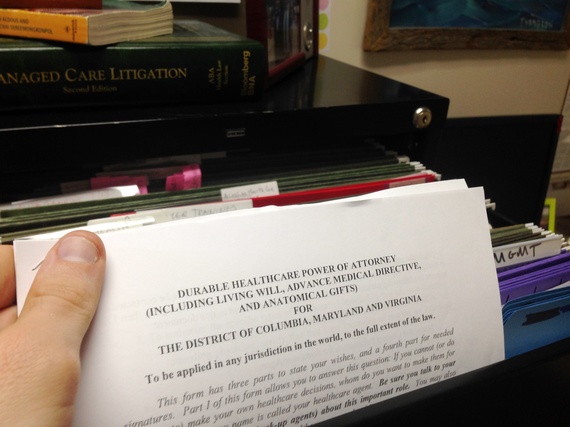Thomas and Jacob are ex-partners who have continued to live together for years after breaking up. Thomas has cancer and although Jacob is by his side, it's his estranged sister who has the legal power to make his medical decisions.
Carla is a transgender woman whose family lives far away and doesn't understand her gender identity. She is worried that if she were to die, her chosen name and true gender wouldn't be respected.
Janet and Wanda are longtime partners with complex medical needs. They don't feel that marriage is a good option for them, but they want to be recognized as partners if one ends up in the hospital again.
Thursday is National Healthcare Decisions Day, an initiative designed to increase healthcare and end-of-life planning. While aging and dying are universal human experiences, the three stories above illustrate how the needs of LGBTQ people are often distinct from those of the population at large. And as a community and as individuals, we ignore these distinctions at our peril.
The names above have been changed, but the stories are from real clients I have served as an attorney at Whitman-Walker Health, a federally-qualified healthcare center where about 50 percent of our patients are LGBTQ. Since launching an Equal Justice Works fellowship in 2013 with funding from the firm Steptoe & Johnson, I have focused on expanding our healthcare planning services to reach more people. Patients are able to complete a healthcare power of attorney (naming their healthcare decision-maker), a living will (stating their end-of-life preferences), and a disposition of bodily remains (putting someone in charge of their final wishes).
So what makes LGBTQ needs different? For starters, we're statistically less likely to be married, have kids, or be close (emotionally or geographically) to our families of origin. If you're thinking to yourself that this situation is changing fast for our community, you're right -- but remember, the people most in need of healthcare planning are older adults who haven't benefited as much by recent social and legal changes.
These differences in families and relationships matter because the law presumes we want our spouse, children, or "traditional" family members to be making decisions for us. If we instead prefer to have someone else make those decisions, we need to take action and complete a healthcare power of attorney. After publishing a post last year in which I decided to name a close friend as my power of attorney (despite my great relationship with my family), I received lots of feedback from people who themselves wanted a friend, lover, ex-lover, or someone else to be at their side. These relationships are simply more common in the LGBTQ community, and lacking "traditional" relationships makes them more essential.
It's not just the power of attorney that becomes more important for LGBTQ people. The living will, in which one states what kind of care they'd like to receive if they had a terminal condition, also takes on an added importance. After all, chances are if your decision-maker is a spouse or child, it's likely that the topic of death and dying has come up at some point (often, when a parent or grandparent dies, and families reflect on what they would have wanted in that situation). But for someone relying on their friend, ex-girlfriend, or roommate to make these decisions, it's less likely that they've ever had "the talk." Completing a living will not only gets these wishes down on paper, but it facilitates a difficult -- but critical -- discussion.
Finally, there are additional concerns for transgender and gender-nonconforming individuals. For folks concerned with having their gender identity respected -- for example, having their appearance maintained properly if they were in a coma, or having the right name used at their funeral -- it becomes critical to name a decision-maker they trust. Additionally, the power of attorney, living will, and disposition of bodily remains can all be modified to explicitly order healthcare providers and others to refer to them by the correct name and pronouns, and to maintain their appearance in an appropriate way. Anyone can learn to modify these documents.
Chances are that today you'll do all sorts of things you don't want to do. You'll stop hitting "snooze" on your alarm, you'll eat a salad instead of a burger, you'll finally pay the feds that big tax bill. Yes, it sucks to think about having a medical emergency. But pushing yourself to "celebrate" Healthcare Decisions Day will buy you a lifetime of peace of mind.

